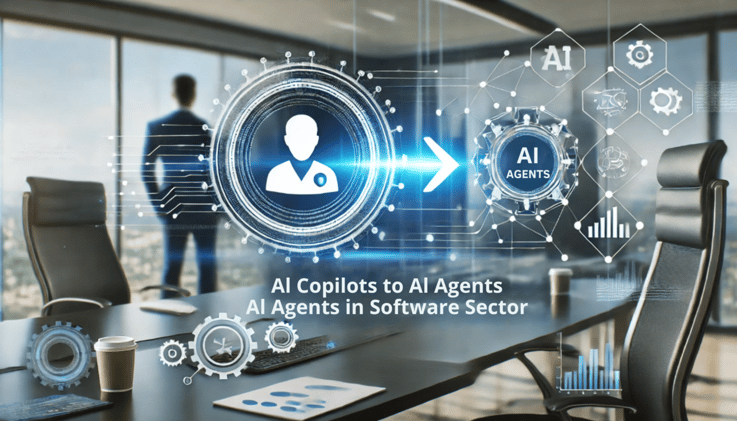The software industry shifts its focus from artificial intelligence copilots to advanced artificial intelligence agents.
The software industry is undergoing a significant transformation as major players like Microsoft, Salesforce, and Workday pivot from AI copilots to AI agents. In recent announcements, these companies have positioned AI agents at the core of their future plans, moving beyond the capabilities of traditional copilots. Oracle and ServiceNow have also embraced the concept at recent industry conferences, signaling a broader industry trend.
Defining AI Copilots and AI Agents
AI copilots, a term popularized by Microsoft, refer to AI assistants designed to support users by providing suggestions, completing tasks, and assisting with workflows. These copilots gained widespread attention with the rise of ChatGPT and similar technologies. However, AI agents are a step further. They are autonomous software programs capable of performing complex tasks and providing services independently, often without human intervention.
"’AI agents are sophisticated software programs designed to perform tasks or provide services autonomously for humans or businesses,’" noted PYMNTS in a recent report. They are increasingly handling complex operations, from managing supply chains to booking travel arrangements, and are seen as pivotal to the next phase of AI integration in various industries.
The Potential Impact on the AI Ecosystem
The shift from copilots to agents represents a potentially disruptive evolution in generative AI. If successful, this transition could significantly alter how businesses and workers interact with AI, enabling more advanced automation and operational efficiency.
Jim Tierney, a growth stock investor at AllianceBernstein, shared his cautious optimism with the Financial Times (FT), stating that the software industry is still in a "show me" phase regarding the monetization of AI agents. ‘It is still an open question exactly how this is going to be monetized,’ he added.
Salesforce CEO Criticizes Copilot Implementation
Salesforce CEO Marc Benioff has expressed skepticism about the traction of AI copilots, suggesting that Microsoft’s approach has misled customers. ‘Microsoft has deceived customers with their AI strategy, they don’t need to DIY it,’ Benioff told the FT. ‘We build it into our platform, customers shouldn’t be forced to train and retrain their models.’ This highlights the ongoing debate over the best approach to implementing AI technologies within enterprise platforms.
AI Agents in Financial Transactions
In related news, Skyfire, a startup focused on AI financial management, is working to enable agents to independently handle financial transactions. Their platform allows AI agents to hold balances, send and receive payments, and conduct transactions with both humans and other AI entities.
"’The next million customers for a lot of enterprises is going to be an AI agent,’" said Amir Sarhangi, CEO and co-founder of Skyfire. ‘Enterprises have to figure out very quickly how to sell their services to an AI agent versus a human being.’ Sarhangi believes that AI agents are beginning to take over routine tasks, performing them on behalf of individuals and businesses.
Future Implications for the Software Sector
As AI agents gain traction, they could transform how companies approach automation and customer interaction. While the potential for disruption is high, the path to widespread adoption and monetization remains uncertain. The coming years will be crucial for tech firms to refine their AI strategies and demonstrate the value of AI agents in real-world applications.
Benefits of AI Agents
AI agents offer several benefits over traditional copilots:
- Autonomy: AI agents can perform complex tasks independently, without human intervention.
- Scalability: AI agents can handle multiple tasks simultaneously, making them ideal for large-scale operations.
- Efficiency: AI agents can automate routine tasks, freeing up human resources for more strategic activities.
Challenges in Implementing AI Agents
While AI agents hold significant potential, several challenges need to be addressed:
- Monetization: The software industry is still figuring out how to monetize AI agents effectively.
- Training and Development: Developing and training AI agents requires significant investment in resources and expertise.
- Security: Ensuring the security of AI agents is critical to prevent potential risks such as data breaches or unauthorized access.
Industry Adoption
Industry leaders are beginning to recognize the value of AI agents:
- Microsoft has announced plans to develop AI agents that can perform complex tasks independently.
- Salesforce has expressed interest in developing AI agents for its platform.
- Oracle and ServiceNow have also started exploring the potential of AI agents.
Conclusion
The shift from copilots to agents represents a significant evolution in generative AI. While challenges remain, the benefits of AI agents are undeniable:
- Increased efficiency: AI agents can automate routine tasks, freeing up human resources for more strategic activities.
- Improved scalability: AI agents can handle multiple tasks simultaneously, making them ideal for large-scale operations.
- Enhanced autonomy: AI agents can perform complex tasks independently, without human intervention.
As the software industry continues to evolve, it is essential to address the challenges associated with implementing AI agents effectively. By refining their strategies and demonstrating the value of AI agents in real-world applications, tech firms can unlock the full potential of this transformative technology.

